by Alfonso Arau
Starring:
Marco Leonardi - Pedro Muzquiz
Lumi Cavazos - Tita
Regina Torné - Mamá Elena
Mario Ivá n Martínez - Doctor John Brown
Ada Carrasco - nacha
Yareli Arizmendi - Rosaura
Claudette Maillé - Gertrudis
Pilar Aranda - Chencha
Farnesio de Bernal - Cura
Joaquín Garrido - Sargento Treviño
Rodolfo Arias - Juan Alejándrez
Margarita Isabel - Paquita Lobo
Sandra Arau - Esperanza Muzquiz
Andrés García Jr. - Alex Brown
Regino Herrera - Nicolás
|
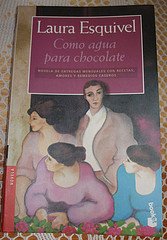
|
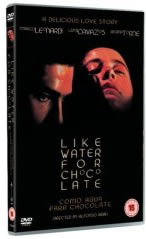
|

|
SYNOPSIS
This film is based on the novel by Laura Estivel and was produced by the director Alfonso Arau in Mexico in 1992. The main character is Tita the youngest daughter of Mamá Elena, and the central storyline concerns the strict custom in those times which required the youngest daughter to care for her mother until she died. The poor Tita has no option but to bow to this cruel custom despite her love for boyfriend, Pedro.
The story takes place against the backdrop of the Mexican Revolution around the turn of the 19th century. Pedro has asked to marry Tita but Mamá Elena refuses permission and instead offers the hand of her other daughter, Rosaura. The wedding goes ahead and Pedro tells Tita he only married her sister so that he could keep near to Tita. Disconsolate, she takes refuge in the kitchen and magically transfers her feelings into the food that she cooks. The kitchen eventually becomes a meeting place for Tita and Pedro.
When Pedro and Rosaura have a baby son Tita looks after him and even feeds him her own milk. However Mamá Elena is suspicious of Tita and Pedro and arranges for Pedro, Rosaura and baby son to go to live in Texas where there is better medical care for the child. Unfortunately, because the baby loses Tita`s milk he becomes ill and tragically dies anyway. This drives Tita to a breakdown and she leaves the ranch to be cared for by a doctor family friend. However she does not speak for months, until a visit from a childhood friend helps her to recover.
Then Mamá Elena dies in an accident and Tita returns to the ranch and meets up again with Pedro. When Rosaura and Pedro have another child, Esperanza, she also likes cooking and spends time in the kitchen with Tita. Finally Tita and Pedro get together in a spectacular, emotional and fiery end to the story.
There are great performances from Lumi Cavazos as Tita, and Regina Torne as her formidable mother. Entertaining cameos are created by Chencha, Gertrudis and Pedro. It`s an entertaining tale, well worth watching |
|
SINOPSIS
La película está basada sobre la novela de Laura Estival y fue producido por el director Alfonso Arau en México en 1992. La carácter principal es Tita, la hija más jóven de Mamá Elena, y la trama sigue la tradición estricta en esta época que requería la hija más jóven de cuidar a su madre hasta que la muerte. La pobre Tita no tuvo opción sino que obedecer a esta tradición a pesar de su amor por su novio, Pedro.
La historia tiene lugar en la época de la revolución mejicano, alrededor del final del siglo XIV. Pedro ha pedido permiso para casarse con Tita pero Mamá Elena no acepta la propuesta y le ofrece la mano de su otra hija, Rosaura. Pedro se casa con Rosaura pero dice a Tita que lo ha hecho sólo para acercarse a Tita. Desconsolada, busca refugio en la cocina y transfere sus sentimientos a la comida que coce de manera mágica. Después de poco, la cocina se convierte en un lugar donde se encuentran Tita y Pedro.
Cuando Pedro y Rosaura tienen un hijo, Tita le cuida y aún le da el pecho a él. No obstante, Mamá Elena desconfia de Tita y Pedro y lo arregla para que Pedro, Rosaura y su hijo se vayan a vivir en Texas, donde hay mejor asistencia médica para el niño. Desgraciadamente, como el bébé pierde la leche de Tita, se pone enfermo y de todos modos muere trágicamente. Esta muerte causa a Tita de sufrir un crisis y dejar la hacienda. Un médico, amigo de la familia, cuida de ella pero ella no habla durante meses, hasta que la visita de una amiga de juventud le ayuda a recuperarse.
Entonces Mamá Elena muere en un accidente y Tita vuelve a la hacienda y le encuentra otra vez con Pedro. Cuando Rosaura y Pedro tienen otra hija, Esperanza, a ella le gusta cocinar y pasar tiempo en la cocina con Tita. Finalmente, Tita y Pedro se juntan en un final espectácular, emocional y ardiente de la historia.
Las interpretaciones de Lumi Cavazos como Tita y Regina Torne como su madre tremenda son muy fuertes. Chencha, Gertrudis y Pedro dan cameos divertidos - es una historía divertida y vale la pena verla. |
EL HIJO DE LA NOVIA
by Juan Jose Campanella
Starring:
Ricardo Darín - Rafael Belvedere
Héctor Alterio - Nino Belvedere
Norma Aleandro - Norma Belvedere
Eduardo Blanco - Juan Carlos
Natalia Verbeke - Naty
Gimena Nóbile - Vicky
David Masajnik - Nacho
Claudia Fontán - Sandra
Atilio Pozzobon - Francesco
Salo Pasik - Daniel
Humberto Serrano - Padre Mario
Fabián Arenillas - Sciacalli
Mónica Cabrera - Carmen
Giorgio Bellora - Marchiolli
Mónica Virgilito - Enfermera hospital |
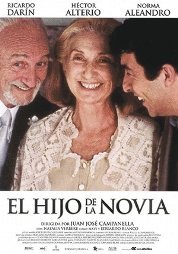
|

|
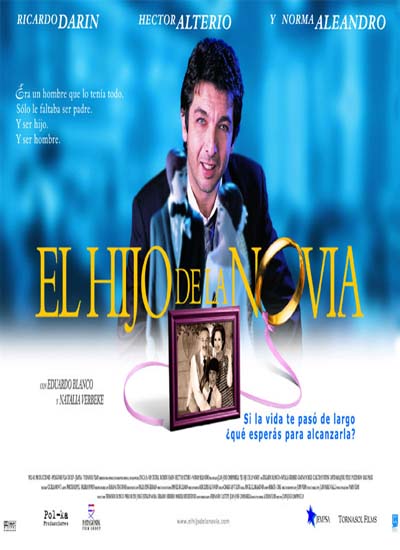
|
SYNOPSIS
El Hijo de la Novia (The Son of the Bride) is an entertaining film with a variety of situations well presented. The central character, Rafael, is 42 years old, divorced and very stressed, as proprietor of a successful restaurant in Buenos Aires in Argentina.
However, he has no time for his family; his young daughter who lives with his former wife; his girlfriend, Natalia; and his mother, Norma, who suffers from Alzheimers and lives in a home. The thread of the story is based on the wish of his father, to give his wife a loving gesture by marrying her in white and in a church. Rafael thinks the idea is crazy and does not want to help his father organise it. The Rafael has a heart attack but recovers and realises he has too much pressure in his life. He sells his restaurant and wants to spend more time with his daughter. He also agrees to help his father arrange the wedding. Eventually he also realises he should pay more attention to his nice girlfriend. The wedding goes ahead and everyone lives happily ever after. The film evokes many emotions in the observer, as a good production should. |
|
SINOPSIS
El Hijo de la Novia es una película muy entretenida con una variedad de situaciones que están bien presentadas. El personaje central, Rafael, tiene 42 años, es divorciado y está muy estresado, dueño y administrador de un restorante que tiene éxito en Buenos Aires en Argentina.
Sin embargo no tiene tiempo para su familia; su hija joven que vive con su ex-mujer; su novia, Natalia; y su madre, Norma que sufre de una versión muy avanzada del Mal de Alzheimer, y vive en un asilo de ancianos. El hilo de historia está dado por el deseo de su padre de dar a su mujer un gesto amoroso por desposarla de punta en blanco, y por iglesia. Rafael piensa que la idea es loca y no quiere ayudar a su padre organizarlo. Entonces, Rafael sufre un infarto pero afortunadamente se recupera y se da cuenta de que tiene demasiada presión en su vida. Vende su restaurante y quiere pasar más tiempo con su hija. También acepta a ayudar su padre organizar la boda. Por fin, acepta de cuenta que debe prestar mas atención a su novia bonita. La boda marcha y todos viven en felicidad hasta siempre. La película evoca muchas emociones en el observador como deben las producciones buenas. |
THEMES
- Alzheimers
- Divorce
- Love
- The church and its traditions
- Family
- Marriage |
|
TEMATICAS
- El Mal de Alzheimer
- El divorcio
- El amor
- La iglesia y sus tradiciones
- La familia
- El matrimonio |
RELATED LITERATURE
1) El Hijo De LA Novia (Rba Literaria) by Juan Jose Campanella, Fernando Castets, 2002. by Juan Jose Campanella, Fernando Castets, 2002. |
VOLVER
by Pedro Almodóvar
Starring:
Penelope Cruz as Raimunda
Carmen Maura as Abuela Irene Raimunda’s mother
Lola Duenas as Sole Raimunda’s sister
Blanca Portilla as Agustina family friend
Yohana Cobo as Paula Raimunda’s daughter
Chus Lampreave as aunt Tia
M. Isabel Diaz as Regina
|
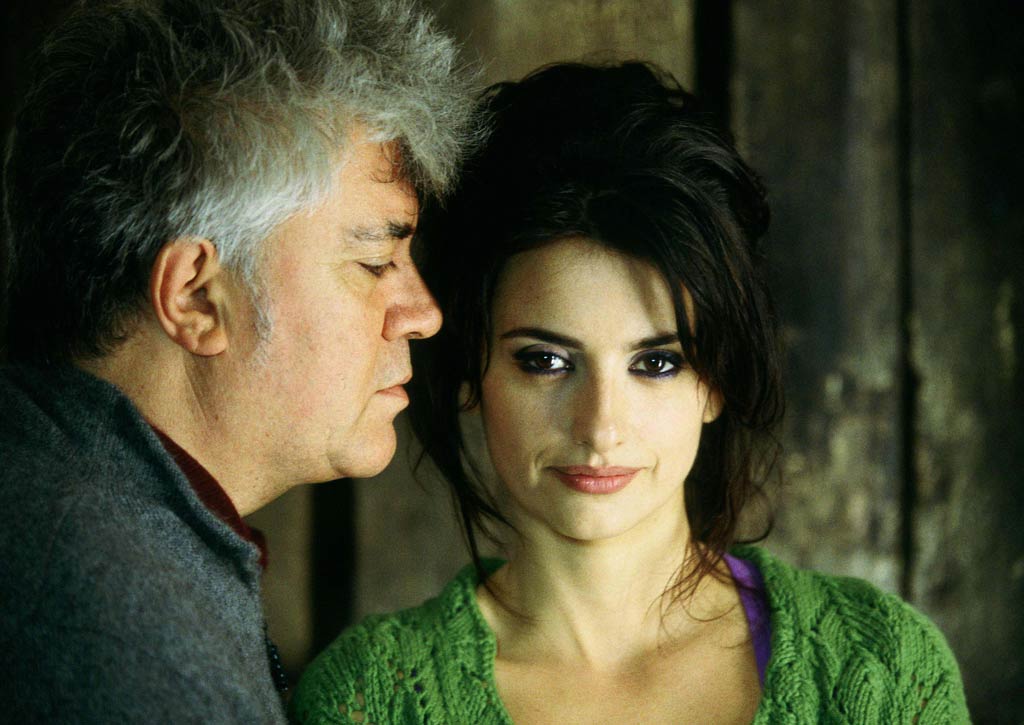
|
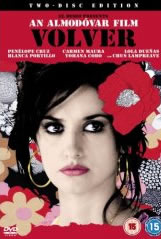
|
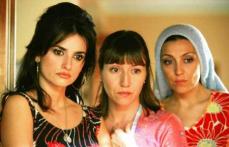
|
SYNOPSIS
The story is set in contemporary Madrid. Raimunda is an attractive and enterprising young mum with an unemployed husband, Paco, and an adolescent daughter. The finances of the family are very tight so Raimunda has various jobs. She is a very strong woman, a born fighter, but sometimes very emotionally fragile. Since her childhood she has kept a terrible secret regarding her father, which is revealed during the film. Her sister Sole is a littler older. Her husband left her and since then has lived on her own.
One Sunday in spring, Sole calls Raimunda to tell her that aunt has died. Raimunda adored her aunt but cannot go to the funeral because just moments before receiving her sister’s call, Raimunda finds her husband dead in the kitchen with a knife lodged in his chest. Her daughter confesses that she has killed him because her father, whilst drunk, has persistently sexually harassed her.
Reluctantly Sole travels to the village alone for the funeral of her aunt. Amongst the women who attend the funeral she hears rumours that her mother – who died in a fire with her father years ago – had returned from the other world in order to care for her infirm aunt Paula in her remaining years. The neighbours talk openly of the ghost of her mother. When Sole returns to Madrid, she hears a noise coming from the trunk while she parks her car. She opens it and finds the ghost of her mother, surrounded by bags. But is this figure really a ghost or are further secrets to be revealed?
Regarding the other sister, Raimunda lies to Sole about the death of Paco, saying that her husband has left her with no intention of returning. In reality, she has buried the body.
The untenable becomes the day-to-day, as the two sisters embark on an escape to the future, surviving tense situations, melodramas, the comical and the emotional. Both women survive through pure nerve and lies. ‘Volver’ is a story of survival. All the characters fight to survive, including the ‘ghost’ of the mother. |
|
SINOPSIS
La historia se desarrolla en Madrid contemporánea. Raimunda es una joven hermosa y emprendadora con un marido parado y una hija adolescente. Las finanzas de la familia son muy ajustadas así que Raimunda tiene algunos trabajos distintos. Es una mujer muy fuerte, nacida una luchadora, pero a la vez muy frágil de manera emocional. Desde su infancia ha guardado un secreto terrible en cuanto a su padre; un secreto que se revela durante la película. Su hermana mayor Sole vive sola desde que se fue su marido.
Un domingo en primavera, Sole llama a Raimunda para decirle que su tia Paula ha muerto. A Raimunda le encanta su tia pero no puede ir al entierro porque momentos antes de recibir la llamada de su hermana, Raimunda encontró a su marido muerte en la cocina con un cuchillo en su pecho. Su hija confesa que le ha matado porque su padre, mientas que era borracho, la ha acosado sexualmente de manera continua.
De mala gana, Sole viaja al pueblo sola para el entierro de su tía. Entre las mujeres que assisten al entierro, oye rumores que su madre – quien murió en un incendio con su padre hace muchos años – había vuelto del otro mundo para cuidar a su enferma tia Paula en sus últimos años. Los vecinos hablan abiertamente de la fantasma de su madre. Cuando Sole vuelva a Madrid, oye un ruido que viene de la maleta mientrás que aparca el coche. La abre y encuentra la fantasma de su madre, entre las bolsas. No obstante, ¿es esta figura una fantasma o se va a descubrir más secretos?
En cuanto a la otra hermana, Raimundo miente a Sole sobre la muerte de Paco, diciendo que su marido le ha dejado sin intención de volver. En realidad ha enterrado el cuerpo de su marido.
El increíble viene a ser lo que pasa día por día, mientrás las dos hermanas embarcan en un fuga al futuro, sobreviviendo situaciones tensas, melodramas, lo cómico y lo sentimental. Ambas mujeres sobreviven por puro valor y mentiras. ‘Volver’ es una historia de la supervivencia. Todas las caracteres luchan para sobrevivir, incluída la fantasma de la madre. |
THEMES
- Death
- Survival
- Returning
- Family
- Motherhood
- Strong female characters |
|
TEMÁTICAS
- La muerte
- La supervivencia
- Volver
- La familia
- La maternidad
- Mujeres fuertes |
RELATED LITERATURE TO VOLVER AND ALMODOVAR
1) Almodovar on Almodovar by Frederic Strauss, 2006
2) Pedro Almodovar (World Directors Series) by Ernesto R. Acevedo-Munoz, 2007
3) Almodovar: The Labyrinths of Passion by Gwynne Edwards, 2001
4) Desire Unlimited: The Cinema of Pedro Almodovar (Critical Studies in Latin American & Iberian Cultures) by Paul Julian Smith, 2000
5) A Spanish Labyrinth: The Films of Pedro Almodovar by Mark Allinson, 2001
6) Pedro Almodovar Interviews (Conversations with Filmmakers) by Paula Willoquet, 2004
7) Pedro Almodovar y El Kitsch Espanol (Intelectuales) by Carlos Polimeni, 2001
8) Pedro Almodovar (Signo E Imagen) by Antonio Holguin, 1999
9) Post-Franco, Postmodern: Films of Pedro Almodovar (Contributions to the Study of Popular Culture) by Kathleen Vernon and Barbara Morris, 1995
10) Pedro Almodovar by Jean Max Mejean, 2007
11) Pedro Almodovar (Critical Guides to Spanish and Latin American Texts and Films) by Ann Davies, 2007 |
|

